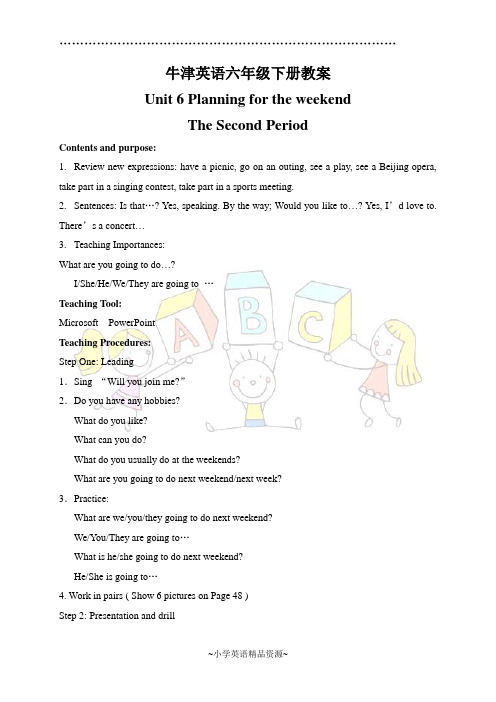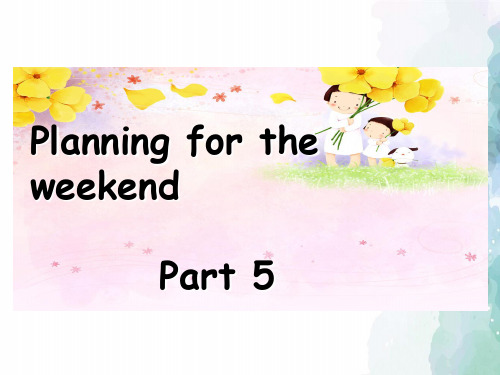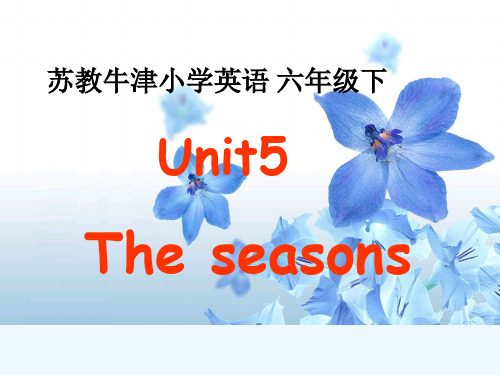苏教版牛津小学英语六年级下册
(苏教牛津版)六年级英语下册课件Unit1(11)

Age
7
9
10
13
12
14
Height 120 125 130 145 138 142
(cm)
Weight
28 31 32
48
42
46
(kg)
An elephant is bigger than a bear. A bear is smaller than an elephant.
small 小的 smaller
A mouse is small. An ant is smaller than a mouse.
mine
yours
fat 胖的 fattபைடு நூலகம்r
苏教牛津版六年级英语下册
Bill
George
young 年青的 younger
George is younger than Bill. than 比 (用于形容词、副词的比较级之后)
Mrs Liu
Mrs Xu
old 年老的 older
Mrs Xu is older than Mrs Liu.
tall 高的 taller
He is taller than her.
Xiao Jun Xiao Lin
short 矮的 shorter 短的
Xiao Lin is shorter than Xiao Jun.
long 长的 longer
That ruler is longer than this ruler.
big 大的 bigger
his
hers
thin 瘦的 thinner
this
that
heavy 重的 heavier
That pumpkin is heavier than this one.
(苏教牛津版)六年级英语下册教案Unit5(1-6)

苏教牛津版六年级下册英语Unit5 The seasons单元教学内容简析本单元由A-H八个部分组成,其主要内容是围绕“季节和气候”这个话题开展各项活动,所涉及的日常交际项目有介绍,询问,建议等,其中,以“询问天气”及其应答为重点内容。
同时学习一些常用的与气象相关的一些词汇。
单元教学要求:1 四会掌握词汇weather, spring, summer, autumn, winter, hot, cold2 四会掌握句型What's the weather like...?3 三会掌握词汇season,because,countryside,warm,cool,rain,rainy,sunny,windy,snowy,cloudy,4 三会掌握日常交际用语Which season do you like best? I like... Why? Because it's ... I can...5 了解字母组合ow在单词中的发音。
6 能诵读歌谣《Seasons》课题: Unit5 第1课时一、教学内容:6B,Unit 5,B部分Look, read and learn.二、教学目标:1.学习B部分,学生会读和拼写spring, summer, autumn, winter。
2.掌握三会单词warm, cool ,sunny, cloudy, rainy, windy三、教学重点:1.学习B部分,套用旧句型,以旧带新。
2.掌握四会单词和复习旧句型。
四、教学难点灵活运用所学句型进行交际。
五、课前准备:1.准备录音机和第五单元的磁带。
2.课前写好本课的课题6B. Unit 5 B部分Look, read and learn.3.一些季节和天气的图片。
六、教学过程:Step1.Free Talk.T: What date is it today? S: It's the ...T: What's the weather like today?S: It’s...Step2. PresentationTeach windy, , rainy,cloudy, sunny, cool, warm.T: Look at the picture, it's rainy.让一排学生读。
苏教牛津版小学英语六年级下册教案 unit6 第二课时

牛津英语六年级下册教案Unit 6 Planning for the weekendThe Second PeriodContents and purpose:1. Review new expressions: have a picnic, go on an outing, see a play, see a Beijing opera, take part in a singing contest, take part in a sports meeting.2. Sentences: Is that…? Yes, speaking. By the way; Would you like to…? Yes, I’d love to. There’s a concert…3. Teaching Importances:What are you going to do…?I/She/He/We/They are going to …Teaching Tool:Microsoft PowerPointTeaching Procedures:Step One: Leading1.Sing “Will you join me?”2.Do you have any hobbies?What do you like?What can you do?What do you usually do at the weekends?What are you going to do next weekend/next week?3.Practice:What are we/you/they going to do next weekend?We/You/They are going to…What is he/she going to do next weekend?He/She is going to…4. Work in pairs ( Show 6 pictures on Page 48 )Step 2: Presentation and drill1. Let’s learn the text. I’ll Make a call:A: Hello!B: Hello, is that …?A: Yes, speaking.B: I am …Do you like …?A: Yes/ No. What is …going to do this afternoon?B: He is going to…A: What is …going to do tomorrow afternoon?B: She is going to…By the way, what are you going to do this weekend? A: I am going to take part in a concert.Would you like to join me?B: Yes, I’d love to.A: Great! See you!B: Bye-bye!(1)Just now I called xxx. Let’s look at the dialogue.1) Learn expressions: speaking(翻译),by the way(朗读), would you like to…(翻译),I’d love to.2) Make a model.3) Work in pairs.2. Let’s learn the text and answer my questions..(1) Look at the questions:What day is it today?What are they talking?What are they going to do today?Where are they going to meet?What are they going to do tomorrow?(2) Listen to the text of computer reading.(3) answer questions and Read after the computer(4) Let’s finish the chart:Who Activities When WhereGao Shan and his Dad See a Beijing opera On Saturday afternoon In the GardenTheatre David Play the violin Tomorrowafternoon In the schoolNancy Play the piano Tomorrowafternoon In the school(5) Judge T or F on Page 47.(6) Open the books and read it..Step 3: ConsolidationMake a new dialogue:A: Hello!B: Hi, is that …?A: Yes, speaking.B: I am … What are you going to do after school?A: I am going to … Would you like to join …?B: Yes, I ’d love to.A: When and where?B: At …A: OK! By the way, what are you going to do this weekend?B: Mum and I are going to … Would you like to come?A: Sure. I ’ll come with … B: That ’s good.Step 4: Homework(1)Do a survey about this weekend:Who Activities When Where (2)Handwriting: Planning for this weekend。
牛津苏教版-英语-六下-(牛津苏教版)六下unit6课件(Part 5)

Try to write your plan for the weekend:
Planning for the weekend
I’m really busy tomorrow. I’m going to get up at 6:15 and do some housework early in the morning. At 9:00 I will go to Qingfeng Park with my daughter. We are going to have a picnic there.
ng for the class project
David is going to have a class outing tomorrow .He and his classmates are going to the zoo. It’s for their class project. They’ll meet at the bus stop at 10:30.They want to look at the monkeys and the elephants .There’s a new zebra in the zoo. It’s from Africa. They are going to see it , too .They are going to come home at 4:30.
4. What time are they going to come home?
Mum: What time are you going to come home ? David : At 4:30 , I think.
Try to retell :
1. Where are they going?
六年级英语下册Unit课件苏教牛津版_5 (2)

seasons
季节
warm
It’s ….. I can….
windy
fly a kite go climbing go to the park ……
hot
rainy
go swimming
It’s ….. I can….eat watermelons catch insects have an ice cream ……
3. Make a new dialogue.
Thank you ! Goodbye!
Exercise 2
Fill in the blanks.
There arefour seasons in a year.Springis the first season .It’ws arm .Sometimes it’s windy.I can fly kites .The weather in summer is very hot.We can goswimming . The best season is autumn.It’scool . Sometimes it’ssunny .The last season in a year iswinter .It’csold . Children like to __g_o__s_k_a_t_in_g_ .
• Hot! hot! So hot! • Hot! hot! So hot!
•
spring?
•
summer?
• What’s the weather like in fall
•
winter
•
rainy
• It’s sunny
•
windy
•
cloudy
牛津苏教版-英语-六下-(牛津苏教版)六下unit4课件(partD)

( ) 1. Su Hai is taller than Su Yang .
( ) 2. Su Hai is also heavier than Su Yang .
( ) 3. They’re not god at running and jumping.
( ) 4. Su Hai runs faster and Su Yang jumps higher.
We hope to see you. Come and visit us soon.
Love Su Yang
Байду номын сангаас
Hello, I’m Jack. I’m student in Shanxi Road Primary School I have a good friend. His name is Mike . Mike is American. He can sing a lot of English songs. I’m 150cm. Mike is as tell as me. We are good swimming and running. I swim faster then him. But he runs faster. Now we are going to school. There’s a basketball match this afternoon. Our school is four kilometres away. We often go to school by bus. There are only two stops. Sometimes we go to school by bike.
4. Is Jack as tall as Mike ? __________________________
(苏教牛津版)六年级英语下册课件Unit3(4)
A: Thank you. B: That’s all right.
Mr . Smith
He comes from Australia. He is living in China now. He is on holiday in Nanjing.
Can you tell me the way to the shopping centre, please?
Go along this street, and then turn left at the fourth crossing, the shopping centre is on your right.
A: Where is the History Museum? B: It’s over there. Go along this street. The History Museum is on your right. A: Thank you. B: That’s all right.
A: Can you tell me the way to the WC,please?
Guangzhou Road
See you !
Can you tell me theቤተ መጻሕፍቲ ባይዱway to the park ,please?
Go along this street,
and then turn right at the second crossing,
the park is on your left.
苏教牛津版小学英语六年级下册教案 unit1 第三课时
牛津英语五年级下册教案Unit1 who is younger?第三课时一、教学内容:《义务教育课程标准实验教科书• 牛津小学英语》6B第一单元第三教时(A. Listen, read and say P7部分)二、教学目标:1. 能正确听说读写词汇:have any brothers or sisters,the only child,in your family,one year younger than me,my mum says,Jack's dog,you've got.2. 初步掌握理解句型,并能在交际中口头运用比较级句型。
3. 能正确理解、掌握A部分会话,并能朗读、初步表演对话。
4. 能正确完成P7练习。
三、教学重点:1. 能正确听说读写词汇:have any brothers or sisters,the only child,in your family,one year younger than me,my mum says,Jack's dog,you’ve got.2. 能正确理解、掌握A部分会话,并能朗读、初步表演对话。
四、教学难点:a) 能正确理解、掌握A部分会话,并能朗读、初步表演对话。
b) 初步掌握理解句型,并能在交际中口头运用比较级句型。
五、课前准备:a) 教具准备:依照课本制作多媒体课件。
b) 准备录音机和本课A部分的磁带,小黑板一块。
c) 准备A部分的图片。
d) 板书准备:预先写好课题Unit 1 Who is younger?六、教学过程:A. 听歌曲:I wish I was taller.B. Free talkT: Who’s taller than xxx?S: xxx is taller than xxx. /xxx is as tall as xxx. (举班级中两个学生为例,一个高一个矮)T: Who’s younger than xxx?S: xxx's (twenty minutes) younger than xxx.(举班级中两个年龄有差异的学生为例)T: Whose school bag is heavier, yours or mine?S: Yours, I think. (拎起两个书包,比比轻重)T: Who is shorter/stronger than xxx?T: Whose rubber is bigger, his or hers? …C. Revisiona) 听Part A前半部分录音T: Today we’ll Listen to a dialogue, and find out the answer.1) When did Su Hai meet Ben and her cousin?2) Where did they have a chat?3) Does Su Hai have a twin sister? What’s her name?4) Do they look the same? Who's younger, Su Hai or Su Yang?5) Is Su Hai as tall as her twin sister?b) Let Ss listen to the tape, answer it.1) On Sunday morning.2) In the park under a big tree.3) Yes, she is. Her name is Su Yang.4) Yes, they do. Su Yang is younger.5) No, she isn’t. Su Hai is taller than Su Yang.D. Presentation and practice:1.师生对话:引出新授课文。
六年级英语下册 Unit 5(3)课件 苏教牛津版
Look, Some are rowing on the lake; some are riding bikes ;some are walking and some are looking at the flowers.
How happy they are!
I like autumn best(最).
Because it’s cool . I can go to the park with my family. And there’re many fruits in the season .I like fruit very much. They are so delicious.
苏教牛津版六年级下册英语
Unit 5 Seasons
sunny 晴朗的
10℃~20 ℃
warm 温暖的
What’s the weather like today?
It’s sunny and warm.
Shanghai
A: What’s the weather like in …?
B: It’s cloudy .
Spring is a …season. It comes in …The weather is… .The…are green. The …are blooming(开放).
People like to …Some are…Some are…Some are…Some are…I usually ….I think everyone in Spring is very happy. How about you?
My hometown
Seasons
(苏教牛津版)六年级英语下册教案Unit6(1-6)
苏教牛津版六年级下册英语Unit 6 Planning for the weekend单元教学内容简析:本单元围绕“周末活动计划”这一话题开展各项活动,所涉及到的日常交际项目有介绍,打电话,询问和建议等,其中以询问What are you going to do...?及We're going to...为重点内容。
A部分Read and say板块展现了周六上午Gao Shan和David各自通过电话谈论周末安排的情景。
B部分出现了八个有关周末活动的动词短语。
C部分呈现六个活动画面,旨在联系巩固本单元的重点句型What are you going to do? D部分是听写活动的安排。
E部分展示了与妈妈谈论班级要去动物园游玩的场景。
F部分为一个趣味游戏,旨在帮助学生通过游戏进一步复习巩固What are you going to do...?及其回答。
G部分为语音部分,让学生了解字母组合ow在单词中的读音。
H部分是一首歌曲,要求学生能够会唱、并能配以动作进行表演。
单元教学要求:1.能听得懂、会说、会读和会拼写plan, picnic, play, take part in..2.掌握会话中出现的三会单词still, project, zebra, Africa, elephant, concert, outing, Beijing opera show, singing contest, sports meeting.3.能听得懂、会说、会读和会写四会句型:What are you going to do...? We're going to ...4.能听得懂、会说、会读日常交际用语Is that Gao Shan? Yes, speaking. By the way, what areyou going to do...?5.了解字母组合ow在单词中的读音。
6.会说英语歌曲Would you like to join us?单元教学重、难点:见教学要求。
- 1、下载文档前请自行甄别文档内容的完整性,平台不提供额外的编辑、内容补充、找答案等附加服务。
- 2、"仅部分预览"的文档,不可在线预览部分如存在完整性等问题,可反馈申请退款(可完整预览的文档不适用该条件!)。
- 3、如文档侵犯您的权益,请联系客服反馈,我们会尽快为您处理(人工客服工作时间:9:00-18:30)。
小组成员:03110923许玲 03110925杨宋
03110929朱秋环 03110932谢晓
苏教版牛津小学英语六年级下册——unit5 The seasons 一、教学内容分析:
本节课是苏教版牛津小学英语6B Unit5 The seasons B部分 Look, read and learn。
学习的是与气候和天气相关的名词及形容词,通过展示一些季节和天气的图片,激发起学生的学习兴趣,更好地投入到教学活动中来。
二、学习者分析:
本课内容的教学对象为六年级的学生,英语有一定的基础,对英语学习有着极大地热情和兴趣,学生之间能够使用英语进行简单的沟通交流,在小组活动中积极踊跃。
三、教学目标:
1.学习B部分,学生会读和拼写spring, summer, autumn, winter。
2.掌握三会单词warm,cool,sunny,cloudy,rainy,windy。
3.掌握三会句型 1.Which season do you like best?
I like...
Why? Because it's...I can...
2.What’s the weather like...
四、教学重点:
熟练掌握用来形容季节和天气的单词和句型。
五、教学难点:
灵活运用所学句型进行交际。
六、教学分析:
1.老师和学生之间进行提问和对话,加强老师与学生之间的互动,促进学生积极参加语言活动。
2.通过演示图片,生动形象的展现各个季节的气候特征。
七、学法分析:
1.学生通过老师的指导,能够熟练套用旧句型,以旧带新。
2.通过小组合作,让学生使用英语进行对话交流,更加熟练的掌握句型,并加强了他们的合作能力。
八、媒体运用:
多媒体教室,PPT课件。
九、教学过程:
Step1:Question
T:Good moring, boys and girls.What’s the weather like today?(通过提问,调动起学生的兴趣,创设愉快的英语学习氛围。
)
Today we are going to learn Unit5 The seasons.
(教授单词“season”,ask the students read the word.) Step2: Presentation
1.T:How many seasons are there in a year?
There are four.
What are they?
They are spring, summer, autumn, winter。
2.show the pictures on the PPT.
(first,The spring picture)
T:In a year, the first season is spring.(老师领读,学生跟读单词spring.)
What’s the weather like in spring?
It’s warm. (老师领读,学生跟读单词warm.)
3.T:Do you like spring?(ask a student to answer this
question.)
S:Yes.I do.
T:How do you feel in spring? Do you feel cold in spring. S:No, I don’t.
T:Yes,because spring is warm.(将季节与季节特征结合起来,能够更加形象使学生理解。
)
I like spring best.because it’s warm.I can go on an
outing.
以同样的方法教授其他三个季节:
summer autumn winter
hot cool cold
Step3: Pratice:
Ask students to pratice in paris.
-Which season do you like best?
-I like...Why? Because it's...I can...
Step4:Listen and write
(课本42页,听录音,锻炼学生听和写的能力,起到巩固的作用。
)
It is ____in spring. The trees turn____. Ma Li often goes rowing in the park. It is very____in summer.It often____.Ma Li often goes____.The days get____and the nights get____in autumn. It is often sunny. Ma Li often goes____in the countryside. It is not____in winter. It is sometimes____.Ma Li often goes jogging after school.。
